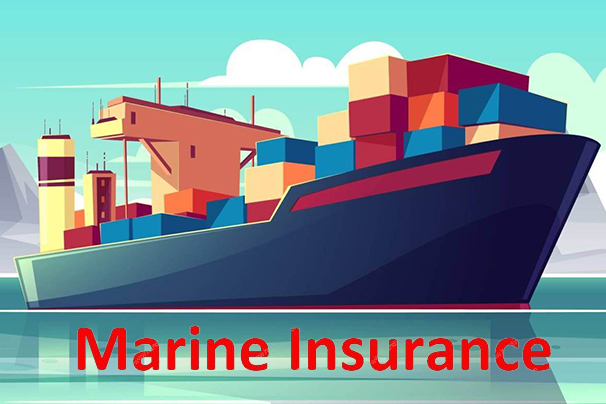Marine insurance is essentially a contract of indemnity that guarantees compensation for any loss or damage incurred during the transportation of goods. This type of insurance is not limited to sea travel, despite its name suggesting otherwise. Instead, it covers all modes of transportation, including air, land, and sea.
These policies cover the loss or damage of ships, cargo, terminals, and other modes of transport used for transferring goods between their point of origin and final destination. The insurance policy acts as a safety net, providing financial protection to ship owners and cargo businesses in case of unforeseen circumstances.

For instance, when goods are transported by air, the insurance policy is referred to as marine cargo insurance. This form of insurance is essential for managing risks and ensuring financial stability in the maritime industry.
How Does It Works
This insurance effectively shifts the responsibility for goods from the involved parties and intermediaries to the insurance provider. Initially, the legal liability of intermediaries handling the goods is limited. By purchasing an insurance policy, exporters can secure maritime insurance coverage for their exported goods, mitigating potential losses or damages. This approach allows exporters to avoid shouldering the sole burden of goods’ safety and instead transfer that risk to the insurance company.
When goods are in transit, whether by air or sea, the carrier assumes liability for any damages or losses incurred during transportation. However, the compensation typically follows a ‘per package’ or ‘per consignment’ basis, which may not fully cover the value of the goods. To safeguard against potential financial losses, exporters often opt to insure their shipments with an insurance company before sending them out, ensuring comprehensive coverage and peace of mind throughout the transportation process.
Types of Marine Insurance
- Freight Insurance
- Liability Insurance
- Hull Insurance
- Marine cargo insurance
Freight Insurance:
In freight insurance, if goods incur damage during transportation, the operator faces a loss of freight income. As a result, the insurance policy is structured to offer compensation for the lost freight, providing financial security for the operator.
Liability Insurance:
This insurance serves as a means to acquire compensation to cover any liabilities resulting from a ship’s collision or crash. This insurance provides protection for potential financial consequences, shielding the ship owner’s interests.
Hull Insurance:
Hull insurance is a unique form of insurance that covers the hull and body of a transportation vehicle. It offers protection against damages and accidents, ensuring the safety and integrity of the transportation infrastructure.
Marine Cargo Insurance:
A marine cargo policy relates to the coverage of commodities shipped from their source country to the destination country. This policy is designed to secure the interests of the exporter and the cargo owner, providing coverage for potential losses or damages during transit.
What is not covered under Marine Insurance?
Understanding what is not covered under marine insurance is just as important as knowing what is covered. Marine insurance policies have specific exclusions that businesses should be aware of to avoid any surprises in the event of a claim. Here are some common exclusions that businesses should be aware of when considering marine insurance.
- Delivery Challenges: this insurance does not cover issues related to the delivery of goods.
- Poor Quality Goods: The insurance policy does not provide compensation for goods of inferior quality.
- Personal Bankruptcy: Marine insurance does not extend to personal insolvency or financial difficulties.
- Renovation and Repair: Damages resulting from renovation or repair work are not covered under marine insurance.
- Deliberate Loss: The policy explicitly excludes coverage for intentional losses or damages caused by the insured party.
- Also, Conflict and War: Marine insurance does not cover losses or damages caused by war or similar situations.
How to Minimize Marine Insurance Claims
Preparing for marine insurance is a crucial step for businesses involved in sea and port activities. By taking certain precautions, businesses can minimize the risk of claims and ensure the safe transportation of their goods. Safe packing practices, robust packing, and anticipating risks are key factors in ensuring a successful marine insurance experience.
- Safe Packing Practices: Ensure the goods are packed with safety in mind, considering the loading and unloading processes.
- Robust Packing: Opt for sturdy packing that can withstand natural hazards to the greatest extent possible.
- Anticipating Risks: Consider the potential for clumsy handling or theft during packing, taking necessary precautions to secure the goods.
By following these guidelines, businesses can minimize the risk of claims and ensure the safe and successful transportation of their goods.
FAQs
What are the principles of this insurance?
Marine insurance operates based on principles like insurable interest, utmost good faith, indemnity, proximate cause, and loss minimization. These principles guide the insurance process and ensure fair and effective coverage.
Is this Insurance compulsory?
While marine insurance is not mandatory in all cases, it is highly recommended for businesses involved in sea and port activities to safeguard against financial losses from physical damage and unforeseen events during shipping.
What is the duration of marine insurance coverage?
This insurance policies typically cover a specific voyage or a specified period. The duration is determined by the terms of the policy and the needs of the insured party.
How are marine insurance claims settled?
Claims under this insurance policies are settled based on the terms and conditions of the policy. The insured party must provide evidence of the loss or damage, and the insurance company will assess the claim and make a payment if the claim is valid.


